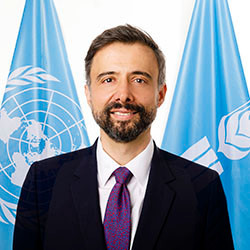Publication of the 2023 report on The State of Food Security and Nutrition in the World (SOFI)
IFAD Asset Request Portlet
Asset Publisher
Publication of the 2023 report on The State of Food Security and Nutrition in the World (SOFI)
Opening Statement by Alvaro Lario, President of IFAD
By Alvaro Lario
Location: UN HQ, New York
12 July 2023Check against delivery
Excellencies,
Colleagues,
This year’s SOFI report confirms what those of us working to combat hunger know all too well. Global progress in ending hunger has stalled at unacceptably high levels.
The food crisis continues. More than 3.1 billion people are unable to afford a healthy diet, and more than one child in five is stunted.
I thank all five agencies for their collaboration in producing this report that shows the world where we stand.
The data will inform the decisions we have to take. Hunger declined in Asia and Latin America, but increased in Western Asia, the Caribbean and all sub-regions of Africa.
While food insecurity afflicts urban and rural households alike, it is strongest in rural areas. Data from a recent IFAD impact assessment show that more than half of food insecure households in rural areas are headed by women. Many of these families face multiple disadvantages, such as poor health, lack of clean water, and limited access to education.
If we truly want to end hunger, we need to tackle the underlying causes, and that means we must shift our perspective and invest in long-term solutions to food insecurity and under-nutrition.
Three-quarters of the world’s poorest people live in the rural areas of developing countries.
The proportion of people living in towns and cities is expected to reach 70 per cent in the next few decades. As urban populations grow, they will look to rural areas for their food needs. This presents opportunities for rural areas to expand income-generating activities on and off the farm, especially for women and youth.
But urbanization also facilitates access to cheap, convenient, processed foods. These are often energy-dense and high in fats, sugars and salt, which contribute to malnutrition and diet-related diseases.
Access to food does not always mean access to nutritious food or a healthy diet. This is also borne out by data from IFAD’s impact assessment.
Investing in rural development is key to reducing poverty and hunger in rural, urban, and peri-urban areas alike. This requires developing longer, more complex, and more equitable value chains.
How can we ensure this increased investment?
First, we need policies and legislation that support better rural-urban connectivity, and that link small-scale producers and other small agri-businesses to fair and remunerative markets. Rural people also need better access to training, technology, and finance.
And second, to stimulate private investment, we need governments and development agencies to lead the way with their own investments.
Dear Colleagues,
IFAD’s mission is to invest in rural people to end poverty and hunger. In the coming years we will work closely with the other development partners to transform food systems in ways designed to end hunger while also safeguarding the world’s precious natural resources [or “while also safeguarding the environment].
In particular, we will help scale-up climate resilience across food systems. We will pay close attention to the most vulnerable, including women, youth, and indigenous peoples, and we will work to increase access to nutritious foods.
Let me leave you with one final thought. Development is sustainable when people have the right tools, the right resources, the right polices and institutions, and the right investments to lead their own development.
The food systems approach embraces all of these elements. Let us use it to ensure the world’s most marginalized and forgotten people have the tools and resources they need to lift themselves out of poverty and hunger.
Thank you.
